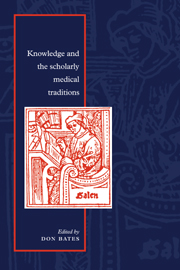1 - Scholarly ways of knowing: an introduction
Published online by Cambridge University Press: 01 February 2010
Summary
The title for the workshop from which this volume evolved was ‘Epistemology and the Scholarly Medical Traditions’. The original idea was to look at the question, ‘How did Galenic, Chinese and Āyurvedic doctors use written texts as authorities for their claims to knowledge?’ Contributors were left considerable freedom, however, to interpret the original title as they pleased because enforcing any particular orientation would have risked subverting our comparative enterprise before it had begun.
That proved to be a wise decision. In our very first session together, Jim Hankinson defined ‘epistemology’ as ‘a self-conscious theory of knowledge’. A little later, Judith Farquhar observed that, for a Sinologist, every word of that definition would have to be reinterpreted, ‘quite possibly including “of”. As the reader will discover, ‘epistemology’ turns up frequently, and it is indeed a troublemaker. It has a decidedly Eurocentric ring to it. In an effort to avoid some of the pitfalls associated with the term, this essay will step back a bit and reflect, historically, anthropologically and meta-epistemologically, on the ways in which these traditions have (or have not) claimed special status for their scholarly medical knowledge at various times in history.
But first, a word or two is needed about the overall strategy of the volume. All the chapters are devoted to the past except for those by anthropologists Judith Farquhar and Lawrence Cohen who talk about present-day events in China and India, respectively. In retrospect, I regret the omission of something about modern Unani medicine so as to have touched on living examples of all three traditions.
- Type
- Chapter
- Information
- Knowledge and the Scholarly Medical Traditions , pp. 1 - 22Publisher: Cambridge University PressPrint publication year: 1995
- 4
- Cited by

